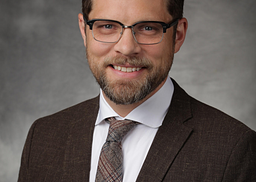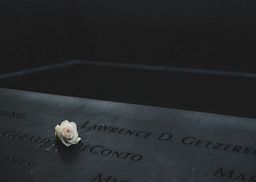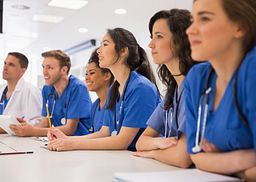‘Adapt and See Things Differently’: Lessons Learned from Previous Disasters
As PA programs adjust to the new reality triggered by the COVID-19 pandemic, many faculty members are drawing on previous experiences handling other disasters in the recent past â hurricanes, floods, even 9/11. We spoke to a few faculty members around the country to see what they took away from past crises that could be useful now. (As always, ŽóÏăœ¶ÊÓÆ” wants to share your stories!)
Lesson 1 â Adapt and Be Flexible
Adaptability is perhaps the most important quality in a crisis, according to faculty interviewed for this story. Sometimes things must be done differently, and if good is less than perfect, it is much better than nothing.
âPA programs will have to adapt and see things differently,â said Debra Munsell, director of the developing PA program at Mississippi State University. Munsell was on the faculty of the UTMB-Galveston PA program when Hurricane Ike devastated Galveston Island in 2008. âWe did not want to do some of the things we had to do [when Ike hit], but we had to do them. We were not allowed back on the island for six weeks, so we had to think out of the box for clinical rotations.â For didactic teaching, the program had to find space in movie theaters and churches, even an old DMV building.
For Ashley Fort, academic coordinator for the PA program at LSU Health Science Center in Shreveport, Louisiana, one of the biggest changes has been in assessment. âWe used to have a block exam that covered two organ systems, then students would take a 75-question test,â said Fort. âNow we are breaking that up into smaller assessments â students can see what they missed and begin doing remediation right away. They can go to their resources to find the correct answer and why their answer was incorrect. This allows for better retention and even some peer-based learning.â
Lesson 2 â Plan Ahead
Very few programs likely had plans in place to deal with anything like the current situation but having at least some plans in place is better than none. Kim Stokes, director of clinical education at East Carolina University (ECU) in Greenville, North Carolina, a few miles inland of the Outer Banks (aka the âGraveyard of the Atlanticâ), had worked on hurricane plans after experiencing âhundred-year floodsâ for two years in a row. âRoads were closed and clinics were closed,â she said. âSo we came up with a contingency plan.â (The plan is .) âThe plan really helped to set the groundwork for what we are doing now.â
âThere is no way to plan for any one disaster. So we plan for the things that happen most commonly,â said Joseph Tommasino, chair of PA programs at the School of Health Sciences at Touro College, who has taught courses in medical management and biocasualties at the U.S. Army Institute for Infectious Disease at Fort Dietrich, Maryland. âI never thought that training would be so on the mark,â he said. âThere will always be a shortage of something. Now itâs ventilators and masks. But thereâs never a way to really predict what youâll need, so you have to be ready for anything.â
Lesson 3 â Buy Time
With the future so uncertain, most programs are trying to keep clinical year students learning until they can get back on rotations. âWe already had some resources in place â online modules that students could do, either self-directed or what they need based on their core rotations,â explained Stokes. âIf they were on a geriatrics rotation, they could do the Stanford palliative care modules, for example. Or on a peds rotation, they could do modules from the American Academy of Pediatrics.â
Yet, supplementing hands-on clinical education can only work for so long. âMost of the time we canât just replace the whole peds rotation,â said Stokes. âIn two weeks of clinical, you can still knock out plenty of hours, though we can supplement with online cases. We set up an instructor to do small groups with peds cases. Or I did an inpatient medicine supplement using critical thinking exercises.â When the ECU program had to move from its two-week plan to its six-week plan, they created an alternative elective, a capstone project. âThe students donât love it; they want something clinical. But it is buying us time to develop an elective that will give the students what they still need.â
In Tommasinoâs program, the masterâs dissertation project was moved up to earlier in the sequence. âThis buys us about 20 weeksâ time,â he said.
Lesson 4 â Crises Can Help Students Learn
Without doubt, many students are being seriously affected by the pandemic, with clinical rotations lost, didactic education sometimes disrupted, and graduations and new jobs imperiled. But if there is a silver lining, it is that helping to tackle the current crisis is itself valuable training.
Fort was a PA student at the LSU program in Shreveport in 2005 when Hurricane Katrina hit. âEverybody from down south came up north,â she recalled. âThere were a lot of people displaced from New Orleans; we did a lot of volunteering. As a student just beginning to learn how to do physical exams, to have the opportunity to get thrown in earlier than normal helped us to learn about the importance of health care. There were just so many people who were without medicine who needed help. It emphasized the importance of our profession.â
Students today are also pitching in around the country, including helping with public health projects at Rutgers and the University of Utah.
Lesson 5 â Keep Looking Ahead
Munsell, who had to learn to adapt when the established UTMB program was hit by Hurricane Ike, is now working on revising her plans for her developing program. âWe were all caught off guard,â she said. âWe all need to think about how we are going to deliver things differently. We are still developing our program â so we said, âLetâs think about how we can adapt this to online.â â
Students, too, can learn to look ahead. âIf we teach them anything from this, itâs to be prepared for anything,â said Tommasino.
To learn more about how your faculty colleagues are adapting, join the conversations on the and see what they are posting on the . ŽóÏăœ¶ÊÓÆ” Learning staff are ready to help you sign up if you havenât already. Please email them at learning@ŽóÏăœ¶ÊÓÆ”online.org.




